Gardeners in Bracknell Forest: Nurturing Green Spaces
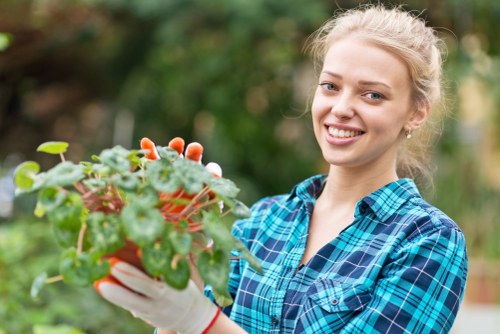
Bracknell Forest is a haven for gardening enthusiasts, offering a diverse range of plants and picturesque landscapes. Whether you are a seasoned gardener or just starting, Bracknell Forest provides ample opportunities to cultivate your green thumb.
The region boasts a temperate climate, which is ideal for growing a variety of plants, from vibrant flowers to robust vegetables. Gardeners here can take advantage of the fertile soil and the community resources available to create thriving gardens.
Local gardeners benefit from numerous community gardens, workshops, and gardening clubs that foster a collaborative environment. These resources not only provide knowledge and support but also encourage the sharing of gardening techniques and innovations.
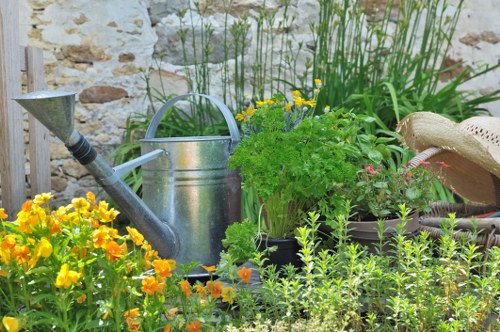
Understanding the Climate of Bracknell Forest
The climate in Bracknell Forest is predominantly temperate, characterized by mild winters and warm summers. This climate supports a wide range of plant species, allowing gardeners to experiment with different types of flora throughout the year.
Rainfall is evenly distributed across the seasons, ensuring that gardens remain hydrated without the need for excessive irrigation. This natural rainfall pattern is beneficial for maintaining healthy plants and reducing water usage.
Gardeners can optimize their planting schedules based on the local climate, taking advantage of the longer growing seasons to maximize their garden's productivity.
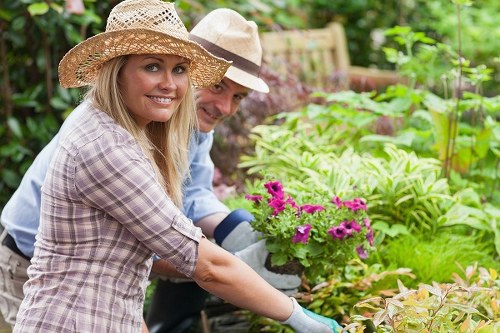
Essential Gardening Tips for Bracknell Forest
Soil Preparation
Preparing the soil is a crucial step in successful gardening. In Bracknell Forest, the soil tends to be rich in nutrients, but it's important to ensure it has the right pH balance for the plants you intend to grow.
Amending the Soil
Add compost or organic matter to improve soil structure and fertility. This not only enhances plant growth but also promotes beneficial microbial activity.
Choosing the Right Plants
Select plants that are well-suited to the local climate and soil conditions. Native plants often thrive with minimal care and are more resistant to local pests and diseases.
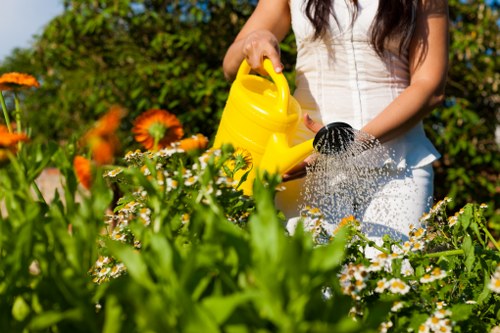
Popular Plants in Bracknell Forest Gardens
Gardeners in Bracknell Forest often favor a mix of perennial and annual plants to ensure year-round color and diversity. Some popular choices include:
- Roses: Known for their beauty and fragrance.
- Lavender: Valued for its scent and ability to attract pollinators.
- Tomatoes: A favorite for vegetable gardens, providing fresh produce.
These plants are not only aesthetically pleasing but also contribute to a healthy garden ecosystem.
Incorporating a variety of plants can help create a balanced garden, supporting different insect species and promoting biodiversity.
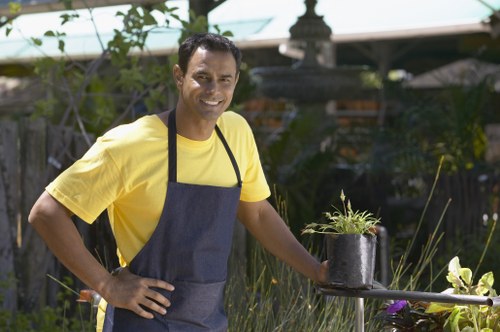
Tools and Equipment for Gardeners
Having the right tools can make gardening tasks more efficient and enjoyable. Essential tools for gardeners in Bracknell Forest include:
- Hand Trowel: Perfect for digging small holes and transplanting seedlings.
- Pruning Shears: Ideal for trimming and shaping plants.
- Garden Fork: Useful for turning and aerating the soil.
Investing in quality gardening equipment ensures durability and better performance, making gardening activities smoother.
Storage and Maintenance
Proper storage of gardening tools can extend their lifespan. Keeping tools clean and dry prevents rust and ensures they are ready for use when needed.
Local Gardening Events and Workshops
Bracknell Forest hosts numerous gardening events and workshops throughout the year. These events provide opportunities for gardeners to learn new techniques, discover innovative products, and connect with fellow enthusiasts.
Participating in local events can enhance your gardening skills and keep you updated on the latest trends and best practices in gardening.
Workshops often cover a range of topics, from organic gardening to landscape design, catering to gardeners of all experience levels.
Community Gardens and Shared Spaces
Community gardens are a cornerstone of Bracknell Forest's gardening culture. These shared spaces allow individuals to cultivate their plots while contributing to a collective green area.
Participating in a community garden fosters a sense of belonging and provides access to resources that might not be available to individual gardeners.
These gardens also serve as a venue for community-building activities and educational programs, promoting sustainable gardening practices.
Sustainable Gardening Practices
Embracing sustainable gardening is essential for maintaining the health of Bracknell Forest's natural environment. Key practices include:
- Composting: Recycling garden waste to create nutrient-rich soil amendments.
- Rainwater Harvesting: Collecting and using rainwater to reduce reliance on municipal water sources.
- Integrated Pest Management: Utilizing natural predators and organic methods to control pests.
Implementing these practices not only benefits the garden but also contributes to the broader ecological health of the region.
Gardeners are encouraged to adopt these methods to promote sustainability and reduce their environmental footprint.
Local Flora and Fauna
Bracknell Forest is home to a rich variety of flora and fauna that coexist within its gardens and natural areas. Understanding the local ecosystem can enhance your gardening experience.
Many native plants attract beneficial insects, such as bees and butterflies, which play a crucial role in pollination and maintaining healthy gardens.
Additionally, the presence of local wildlife, including birds and small mammals, adds vibrancy and life to garden spaces.
Gardening Resources and Support
For gardeners in Bracknell Forest, a wealth of resources is available to support their gardening journey. These include:
- Local Nurseries: Offering a wide selection of plants, tools, and supplies.
- Gardening Clubs: Providing a platform for knowledge exchange and community building.
- Online Forums: Connecting gardeners for advice, tips, and support.
Accessing these resources can enhance your gardening skills and provide solutions to common gardening challenges.
Staying connected with the local gardening community fosters collaboration and continuous learning.
Maintaining Your Garden Throughout the Year
Year-round garden maintenance is essential for the sustained health and beauty of your plants. In Bracknell Forest, seasonal changes require different gardening approaches.
Spring
Spring is the time for planting new seeds and preparing beds for the growing season. It's also ideal for pruning and controlling early pests.
Summer
During summer, focus on watering, weeding, and supporting plants as they grow. This is also the time to harvest vegetables and enjoy blooming flowers.
Autumn
Autumn involves clearing garden debris, planting bulbs for spring, and preparing plants for the colder months.
Gardening Challenges in Bracknell Forest
While gardening in Bracknell Forest offers many benefits, it also comes with its set of challenges. Common issues include:
- Pest Control: Managing insects and animals that can damage plants.
- Disease Management: Preventing and treating plant diseases to maintain garden health.
- Soil Quality: Ensuring the soil remains fertile and well-structured for optimal plant growth.
Addressing these challenges requires proactive measures and informed gardening practices.
Utilizing organic and sustainable methods can help mitigate these issues effectively.
Success Stories from Local Gardeners
Many gardeners in Bracknell Forest have achieved remarkable success with their gardens, showcasing the region's potential for beautiful and productive green spaces.
These success stories often highlight innovative gardening techniques, dedication, and the support of the local gardening community.
Sharing these experiences can inspire and motivate other gardeners to pursue their gardening goals.
10-15 Closest Areas to Bracknell Forest for Gardeners
- Binfield: Just a short distance from Bracknell Forest, Binfield offers several community gardens and nurseries ideal for gardening enthusiasts.
- Windsor: Known for its royal gardens, Windsor provides inspiration and high-quality gardening resources.
- Ascot: With beautiful parks and green spaces, Ascot is perfect for those seeking expansive gardening areas.
- Sonning: Sonning's picturesque landscapes are ideal for gardeners looking to create serene garden settings.
- Brussels: A charming village with local gardening clubs and events supporting community gardening.
- Finchampstead: Finchampstead offers fertile soil areas and a supportive environment for gardening projects.
- Silchester: Silchester's rich history includes well-maintained gardens and botanical diversity.
- Woodley: Woodley's parks and garden centers provide ample resources for local gardeners.
- Crowthorne: With its academic gardens, Crowthorne is a hub for innovative gardening practices.
- Crowthorne Hill: Offers elevated garden spaces with unique planting opportunities.
- Finchampstead Moor: A natural area ideal for gardeners interested in native plant species.
- Kersall Pierson: Known for its community gardening initiatives and local plant varieties.
- Lyndhurst: Lyndhurst's gardens are celebrated for their beauty and diversity.
- Perins: Perins provides fertile grounds and gardening workshops for enthusiasts.
- Wheatley: Wheatley's gardens and nurseries are a favorite among local gardeners.
Engaging with the Bracknell Forest Gardening Community
Connecting with other gardeners in Bracknell Forest can enhance your gardening experience. Whether through local clubs, online forums, or community events, engaging with others provides valuable support and inspiration.
Collaboration and sharing knowledge within the community lead to the exchange of ideas and the development of new gardening techniques.
Active participation in the gardening community fosters a sense of camaraderie and collective growth.
Frequently Asked Questions
1. What are the best plants to grow in Bracknell Forest?
Bracknell Forest's temperate climate is suitable for a wide range of plants, including roses, lavender, tomatoes, and native perennials. It's best to choose plants that are well-adapted to the local soil and climate conditions.
2. Where can I find gardening workshops in Bracknell Forest?
Local nurseries, community centers, and gardening clubs in Bracknell Forest regularly host workshops. You can check their websites or visit in person to find upcoming events.
3. How can I join a community garden in Bracknell Forest?
To join a community garden, contact local gardening groups or municipal offices in Bracknell Forest. They can provide information on available plots and the application process.
4. What sustainable practices are recommended for gardeners in Bracknell Forest?
Sustainable practices include composting, rainwater harvesting, and integrated pest management. These methods help reduce environmental impact and promote a healthy garden ecosystem.
5. Are there any local nurseries in Bracknell Forest you recommend?
Several nurseries in and around Bracknell Forest offer a wide selection of plants and gardening supplies. Some popular options include [Local Nursery 1], [Local Nursery 2], and [Local Nursery 3]. It's advisable to visit these nurseries to explore their offerings and get expert advice.